Antibodies are also referred to as immunoglobulins (Ig). Immunoglobulins are large Y-shape proteins that are primarily created by plasma cells. These generally consist of two identical light chains and two identical heavy chains, which are connected by disulfide bonds.
Five types of mammalian Ig heavy chain exist and the type of heavy chain present will dictate the class of antibody; for example, IgA, IgD, IgE, IgG, and IgM, respectively.
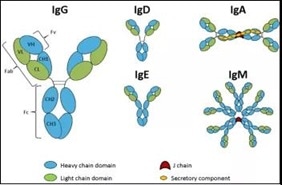
Figure 1. Five different classes of antibodies. Image Credit: ACROBiosystems
IgG is the antibody most frequently found in blood circulation, making up between 10 and 20% of total plasma proteins. IgG is also the most prevalent antibody type among the five classes, comprising around 75% of serum antibodies.
Four IgG subclasses are found in humans: IgG1, 2, 3, and 4, which are labeled in order of their abundance in serum. Each of these four IgG subclasses is structurally similar and comprised of a hinge region, Fab region (variable) and Fc region (constant).
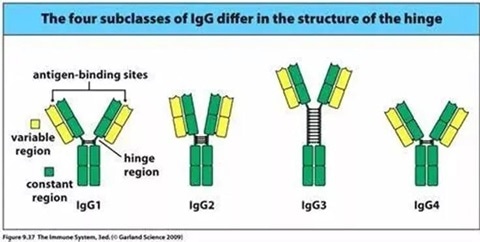
Figure 2. Four IgG subclasses. Image Credit: ACROBiosystems
Since OKT-3 was launched in 1986, an increasing number of therapeutic antibodies are in clinical use. Antibody drugs have developed into an effective target treatment against a range of infectious diseases, cancers, and autoimmune diseases.
Recent years have seen significant advances in bioengineering technology, with researchers placing considerable focus on the study of antibodies’ structure-activity relationship. Fc region engineering has become more common, as the Fc region interacts with Fc receptors and certain proteins in the complement system, therefore enabling the immune system to be activated by the antibodies.
Measuring the interaction of the Fc receptors and the Fc region of antibodies is therefore essential in drug and assay development. The global antibody market is becoming increasingly competitive, so designing a distinct, superior product is vital to success.
As well as screening antibodies that bind different epitopes, Fc region engineering offers a useful approach in the development of competitive products. It achieves this by better optimizing the half-life of antibodies and any related biological effects.
Fc receptors are capable of specifically binding to the Fc region of immunoglobulins. FcRn and FcγR are currently the two most commonly evaluated Fc receptors because the interaction between Fc receptors and antibodies can not only impact half-life, but it is also able to induce immune responses including phagocytosis, Complement-Dependent Cytotoxicity (CDC), and Antibody-dependent cell-mediated cytotoxicity (ADCC).
Fc region engineering is capable of changing an antibody’s affinity to Fc receptors, resulting in a change in CDC or ADCC effect. It is, therefore, especially important to continue to optimize the Fc region.
ACROBiosystems has successfully developed more than 50 high-quality Fc receptor proteins, accommodating a range of different tag species specifically designed to support antibody structural research.
ACROBiosystems’ team of experienced scientists offers comprehensive, integrated SPR&BLI analytical services. The company has served and worked with over 100 customers ranging from industry to academia, with its work supporting numerous antibody drugs IND applications.
The total solution for antibody and Fc receptor affinity testing

Image Credit: ACROBiosystems
Case study
The affinity performance of different IgG antibody subtypes to FcRn receptor-SPR.
Table 1. Source: ACROBiosystems

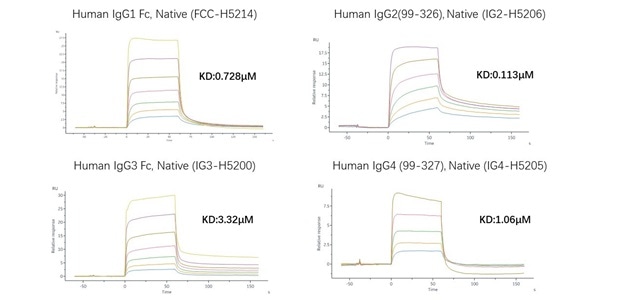
Image Credit: ACROBiosystems
Affinity analysis based on the development of non-mutated IgG1 and human FcγR molecules of different genotypes—SPR.
Table 2. Source: ACROBiosystems
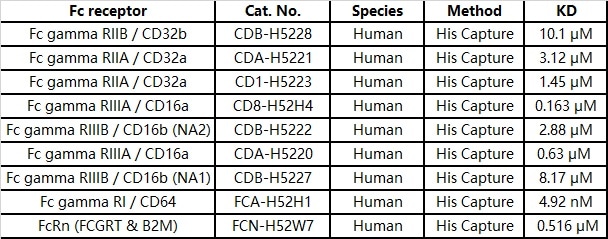
About ACROBiosystems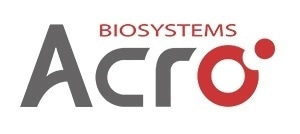
ACROBiosystems is a cornerstone enterprise of the pharmaceutical and biotechnology industries. Their mission is to help overcome challenges with innovative tools and solutions from discovery to the clinic. They supply life science tools designed to be used in discovery research and scalable to the clinical phase and beyond. By consistently adapting to new regulatory challenges and guidelines, ACROBiosystems delivers solutions, whether it comes through recombinant proteins, antibodies, assay kits, GMP-grade reagents, or custom services. ACROBiosystems empower scientists and engineers dedicated towards innovation to simplify and accelerate the development of new, better, and more affordable medicine.
Sponsored Content Policy: News-Medical.net publishes articles and related content that may be derived from sources where we have existing commercial relationships, provided such content adds value to the core editorial ethos of News-Medical.Net which is to educate and inform site visitors interested in medical research, science, medical devices and treatments.